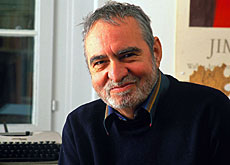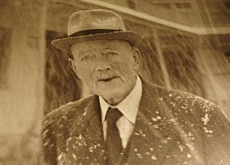Swiss observer of New York dies

Writer Jürg Federspiel, best known outside his native Switzerland as the author of The Ballad of Typhoid Mary, has died. He was 75 years old.
Federspiel had been missing since mid-January and his body was found on Sunday in the Rhine close to the border with France and Germany, said the Basel authorities.
No cause of death was given and there were no outward signs of injury, said Klaus Mannhart, of the Basel safety department. The authorities believe the author might have committed suicide. Federspiel had been suffering from diabetes and Parkinson’s disease in recent years.
He had not seemed particularly worried about dying, with death being a recurrent theme in his work.
“I believe that when you know where and when you are going to die, you don’t fear [death,]” he told the Südostschweiz newspaper in an interview in 2005. “We all know that we are going to die.”
Born near Zurich in 1931, Federspiel worked as a journalist, film critic, essayist and fiction writer, publishing more than 20 novels and collections of stories.
His books were translated into six languages and his best-known work in the English-speaking world was The Ballad of Typhoid Mary.
Considered a work of social criticism, it was based on the true story of a woman in early 20th-century New York who refused to accept that she was the source of numerous outbreaks of typhoid fever.
However, Federspiel told the Südostschweiz that the novel was still five per cent reality and the rest fiction.
New York life
Federspiel was strongly influenced in his work by the prose style of the American short story.
“Before the Second World War, there were many translations of authors such as Hemingway and Faulkner. I read these books and I was fascinated by this new world opening up to me,” he said.
Later on, he spent about eight years of his life in New York, succumbing to the charms of the city.
“With […] his intrepid and rather sarcastic vision of the dark side of humanity, he embraced this monstrous city, a city that appealed to his sense of the grotesque and the absurd,” said Martin Zingg in Zurich’s Neue Zürcher Zeitung.
His New York writing was made up of stories and essays such as Museum of Hate, The Best City for Blind People and Kilroy – Voices in the Subway.
“Among the Swiss writers of his generation, Jürg Federspiel was the most international one,” wrote Charles Linsmayer in Bern’s Bund newspaper.
Federspiel first came to readers’ attention in 1961, when he published his fist book, Oranges and Deaths. Influential German critic Marcel Reich-Ranicki anointed him one of the great hopes of Swiss literature.
Geography of Lust
His best-known book in German is perhaps Geography of Lust, the story of a beautiful woman who accepts a billionaire’s proposal to have a map of the world tattooed on her perfect derrière.
While the billionaire and the tattoo artist fall in love with her, she chooses to marry a blind man who will never see the ink etched into her skin.
Feminists criticised the book, but the author was hardly one to seek consensus.
“Federspiel was neither conciliatory nor nice,” wrote Reinhard Stumm in the Basler Zeitung. “He was contrary – and unlike many of his colleagues – well-read.”
“There hasn’t been this sharpness, this precision, this mercilessness, this mysterious cleanliness of language in Swiss literature before.”
Federspiel was married three times and leaves one son.
swissinfo with agencies
The son of a journalist, Jürg Federspiel was born near Zurich on June 28, 1931. He grew up in Davos, Zurich and Basel.
After finishing school, he worked as a reporter and film critic for major Swiss newspapers during the 1950s. He also travelled to Germany, France, Britain as well as the United States.
During his literary career, he published two dozens books including collections of short stories and novels.
His last book was released in 2001. He did not publish after that date due to his illness.

In compliance with the JTI standards
More: SWI swissinfo.ch certified by the Journalism Trust Initiative


You can find an overview of ongoing debates with our journalists here. Please join us!
If you want to start a conversation about a topic raised in this article or want to report factual errors, email us at english@swissinfo.ch.